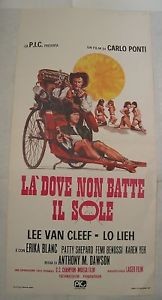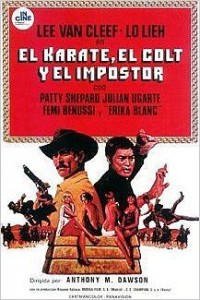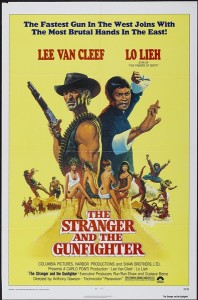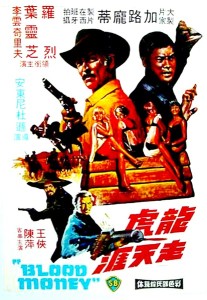Blood Money
龙虎走天涯
Hong Kong/Italy/Spain/US, 1975, colour, 2.35:1, 98 mins.
Director: Anthony M. Dawson [Antonio Margheriti].
Rating: 7/10.
A painless marriage between the Chinese martial arts film and Italian Western, with engaging leads.
California, mid/late 19th century. In Monterey, professional bandit Dakota (Lee Van Cleef) robs a bank whose safe contains only a fortune cookie and four photos of the naked backsides of different women – the property of Wang (Al Tung) who accidentally dies in the robbery. Dakota is caught and sentenced to death. Meanwhile, Wang’s nephew, Wang Hejiang (Luo Lie), arrives from China on an official mission to find out what Wang did with the money he was meant to be investing in the US. Deciphering a clue in the fortune cookie, Wang Hejiang rescues Dakota from hanging and sets out with him to find Wang’s four mistresses whose backsides are in the photos. The American mistress (Erika Blanc) is with a hellfire  preacher, Yancy Hobbitt (Julián Ugarte), and his sidekick Indio (Goyo Peralto); on her backside they find some Chinese writing tattooed. Pursued by Hobbitt and Indio, they subsequently track down the Russian (Patty Shepard), Italian (Femi Benussi) and Chinese mistresses. The last, Li Hua (Ye Lingzhi), works in a laundry. However, Wang Hejiang falls for her and, before he can bring himself to ask about her tattoo, she’s kidnapped by Hobbitt.
preacher, Yancy Hobbitt (Julián Ugarte), and his sidekick Indio (Goyo Peralto); on her backside they find some Chinese writing tattooed. Pursued by Hobbitt and Indio, they subsequently track down the Russian (Patty Shepard), Italian (Femi Benussi) and Chinese mistresses. The last, Li Hua (Ye Lingzhi), works in a laundry. However, Wang Hejiang falls for her and, before he can bring himself to ask about her tattoo, she’s kidnapped by Hobbitt.
REVIEW
This is only the second Hong Kong co-production to reach commercial screens here [in the UK, as of summer 1975], and like the generally disastrous The Legend of the 7 Golden Vampires 七金尸(1974) feeds off an established western popular genre. It is immeasurably  superior to the earlier work in every way, a happy coalescence of an international cast which can be dubbed into anything from Mandarin to Spanish at a moment’s notice. Many of the personnel are as fictitious as the dubbed voices of the cast [in the English-dialogue version]: Anthony M. Dawson is none other than Antonio Margheriti, well-known purveyor of mass of Italian trivia, while Karen Yeh is Ye Lingzhi 叶灵芝, a Shaw Brothers contract actress. Continental sex-stars litter the cast – Erika Blanc, Femi Benussi – while two proven talents bestride the action: Lee Van Cleef, an old hand at Spaghetti Westerns, and Luo Lie 罗烈, a longtime Shaws lead seen here [in the UK] in King Boxer 天下第一拳 (1972) and The Girl with the Thunderbolt Kick [UK release title of Golden Swallow 金燕子, 1968]. It is suprising that Blood Money 龙虎走天涯 does
superior to the earlier work in every way, a happy coalescence of an international cast which can be dubbed into anything from Mandarin to Spanish at a moment’s notice. Many of the personnel are as fictitious as the dubbed voices of the cast [in the English-dialogue version]: Anthony M. Dawson is none other than Antonio Margheriti, well-known purveyor of mass of Italian trivia, while Karen Yeh is Ye Lingzhi 叶灵芝, a Shaw Brothers contract actress. Continental sex-stars litter the cast – Erika Blanc, Femi Benussi – while two proven talents bestride the action: Lee Van Cleef, an old hand at Spaghetti Westerns, and Luo Lie 罗烈, a longtime Shaws lead seen here [in the UK] in King Boxer 天下第一拳 (1972) and The Girl with the Thunderbolt Kick [UK release title of Golden Swallow 金燕子, 1968]. It is suprising that Blood Money 龙虎走天涯 does  not falter amid such a motley crew, but it succeeds for two reasons. First, because the marriage between the Italian Western and Chinese martial arts film is a painless one (the latter owes much to the former stylistically, and regularly plunders it for both backing music and plots). Second, Dawson’s visual manner is much akin to that of Hong Kong action films, and much virtue is made out of the necessity of forward movement. More “co-productions” with the East are waiting on the shelves: George Lazenby is currently pursuing a profitable career with Golden Harvest in such productions as Stoner 铁金刚打破子阳观 (1974), with Mao Ying 茅瑛 [Angela Mao], and The Man from Hong Kong 直捣黄龙 (1975), with Wang Yu 王羽; the second in Hammer’s two-film deal with Shaws, Shatter 夺命刺客, directed by [an uncredited Monte Hellman and producer] Michael Carreras and joining Peter Cushing with Di Long 狄龙 in a modern crime story, was also completed some time ago. One hopes these works will at least have brief airings here [in the UK] commercially, if only to show the lessons that can be learned from mixing Asian and European talents. Blood Money, meanwhile, will serve as an admirable example of what can best result.
not falter amid such a motley crew, but it succeeds for two reasons. First, because the marriage between the Italian Western and Chinese martial arts film is a painless one (the latter owes much to the former stylistically, and regularly plunders it for both backing music and plots). Second, Dawson’s visual manner is much akin to that of Hong Kong action films, and much virtue is made out of the necessity of forward movement. More “co-productions” with the East are waiting on the shelves: George Lazenby is currently pursuing a profitable career with Golden Harvest in such productions as Stoner 铁金刚打破子阳观 (1974), with Mao Ying 茅瑛 [Angela Mao], and The Man from Hong Kong 直捣黄龙 (1975), with Wang Yu 王羽; the second in Hammer’s two-film deal with Shaws, Shatter 夺命刺客, directed by [an uncredited Monte Hellman and producer] Michael Carreras and joining Peter Cushing with Di Long 狄龙 in a modern crime story, was also completed some time ago. One hopes these works will at least have brief airings here [in the UK] commercially, if only to show the lessons that can be learned from mixing Asian and European talents. Blood Money, meanwhile, will serve as an admirable example of what can best result.
The film was shot last year [1974] in Spain (except for the opening and closing scenes in the Chinese palace), and the story-line is tinged with the same logic-defying outrageousness which makes so much Hong Kong production enjoyable. A lecherous Chinese called Wang consigns the secret of his fortune to the backsides of his four mistresses – American, Russian, Chinese and Italian. When Dakota (Van Cleef) accidentally kills him, word reaches the Chinese governor who originally entrusted Wang with the investment of such monies; his nephew Hejiang is sent to California to track down the treasure. Therafter the film develops into a series of sketches as Hejiang and Dakota attempt to locate each mistress, copy the clues (tattooed in Chinese), and ward off other bounty-hunters. On paper the plot sounds gruesomely unfunny; in practice it is innocuously entertaining. Dawson keeps both his camera and actors constantly on the move, and the editing is ruthlessly swift (so swift, in fact, that the final sequence of Li Hua [Ye] reading her clue by means of a mirror and not realising this places the characters back-to-front has been completely removed).
What distinguishes Blood Money (the Chinese title translates as “Imperial Tiger Goes to the End of the World”) from The Legend of the 7 Golden Vampires is the fact that Chinese talent has not been imported merely for the sake of exotic interest or denigration. Luo Lie is clearly the main protagonist: it is his film even more than Van Cleef’s, and the plot is built around his talents. Much good-natured humour is extracted at Van Cleef’s expense, notably in a riverside scene where the European tests the Chinese’s skills. Luo, talking in simplistic coolie English throughout, is the modest Chinaman who outclasses his more flamboyant rivals at every turn. The brief flick of a misplaced lock of hair at the end of a fight scene is his only concession to effort. Such tomfoolery draws an engaging performance from Van Cleef, who shows a nice line in sending up his Spaghetti Western image while pandering to it when the chips are down. In such an atmosphere Luo neatly parodies the more serious nationalism of Li Xiaolong 李小龙 [Bruce Lee] in Fist of Fury 精武门 (1972): a sign outside a saloon warning “No Negroes, No Chinese, or Unaccompanied Dogs Allowed” (a clear reference to “No Dogs or Chinese Allowed” in the Li film) is calmly ignored as he accompanies a huge St. Bernard into the bar.
Characterisation is rich: Julián Ugarte, with his church-on-wheels, glowers in black leather; Goyo Peralto, as the mountainous Indio, provides a fitting match for Luo Lie at the end, to be despatched only by a stomach-tearing punch at the last moment. Amid heavy European sexuality from Blanc and Benussi, Ye outclasses all with her restrained beauty, and Alfred Boreman (in one of the film’s rare moments of reflection) inserts a brief spasm of homesickness. The colour-work, typical of Italian/Spanish productions, is remarkably close to Shaws’ house-style for period films, both in the scenes in the Chinese palace and in the “Californian” landscapes. Only Carlo Savina’s music is wanting: his vacuous, derivative score (Luo’s leaps set to a whistle, and fights to racy modern music) destroys many a combat scene; fortunately Dawson’s visuals are enough to rescue them from total failure. Blood Money is not, of course, pure anything, but Lee Van Cleef and Luo Lie make a persuasive team.
[In Italy the film was titled Là dove non batte il sole, in Spain El kárate el colt y el impostor, and in the US The Stranger & the Gunfighter.]
CREDITS
Produced by Shaw Brothers (HK)/Compagnia Cinematografica Champion (Italy)/Midega Film (Spain)/Harbor Productions (US).
Script: Barth Jules Sussman. Original story: Barth Jules Sussman. Photography: Alejandro Ulloa. Editing: Jorge Serrallonga. Music: Carlo Savina. Art direction: Luis Arguello, Giorgio Postiglione. Costumes: Massimo Bolongaro.
Cast: Lo Lie (Wang Hejiang/Joe Lee), Ye Lingzhi [Karen Yeh] (Li Hua), Lee Van Cleef (Dakota), Wang Xia (warlord), Chen Ping (Wang Hejiang’s sister), Zhan Sen (chief constable), Jing Miao (Wang Hejiang’s father), Ai Donggua (Wang Hejiang’s uncle), Lv Hong (Wang Hejiang’s mother), Jiang Yang (abbot), Julián Ugarte (Yancy Hobbitt, deacon), Goyo Peralto (Indio), Al Tung (Wang), Patty Shepard (Russian mistress; her twin sister), Erika Blanc (American mistress), Femi Benussi (Italian mistress), George Rigaud (Barclay, lord), Ricardo Palacios (Calico), Alfred Boreman (old Chinese laundryman), Bernabé Barta Barry (sheriff), Paul Costello (Mason, Wang Hejiang’s lawyer).
Release: Italy, 11 Jan 1975; Hong Kong, 3 Apr 1975; US, 31 Mar 1976; Spain, 11 Nov 1976.
(Review section originally published in UK monthly films and filming, Aug 1975. Modern annotations in square brackets.)
